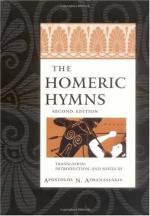“Verily, a great marvel mine eyes behold! These be the tracks of high-horned kine, but all are turned back to the meadow of asphodel. But these are not the footsteps of a man, nay, nor of a woman, nor of grey wolves, nor bears, nor lions, nor, methinks, of a shaggy-maned Centaur, whosoever with fleet feet makes such mighty strides! Dread to see they are that backwards go, more dread they that go forwards.”
So speaking, the Prince sped on, Apollo, son of Zeus. To the Cyllenian hill he came, that is clad in forests, to the deep shadow of the hollow rock, where the deathless nymph brought forth the child of Zeus Cronion. A fragrance sweet was spread about the goodly hill, and many tall sheep were grazing the grass. Thence he went fleetly over the stone threshold into the dusky cave, even Apollo, the Far-darter.
Now when the son of Zeus and Maia beheld Apollo thus in wrath for his kine, he sank down within his fragrant swaddling bands, being covered as piled embers of burnt tree-roots are covered by thick ashes, so Hermes coiled himself up, when he saw the Far-darter; and curled himself, feet, head, and hands, into small space [summoning sweet sleep], though of a verity wide awake, and his tortoise-shell he kept beneath his armpit. But the son of Zeus and Leto marked them well, the lovely mountain nymph and her dear son, a little babe, all wrapped in cunning wiles. Gazing round all the chamber of the vasty dwelling, Apollo opened three aumbries with the shining key; full were they of nectar and glad ambrosia, and much gold and silver lay within, and much raiment of the Nymph, purple and glistering, such as are within the dwellings of the mighty Gods. Anon, when he had searched out the chambers of the great hall, the son of Leto spake to renowned Hermes:
“Child, in the cradle lying, tell me straightway of my kine: or speedily between us twain will be unseemly strife. For I will seize thee and cast thee into murky Tartarus, into the darkness of doom where none is of avail. Nor shall thy father or mother redeem thee to the light: nay, under earth shalt thou roam, a reiver among folk fordone.”
Then Hermes answered with words of craft: “Apollo, what ungentle word hast thou spoken? And is it thy cattle of the homestead thou comest here to seek? I saw them not, heard not of them, gave ear to no word of them: of them I can tell no tidings, nor win the fee of him who tells. Not like a lifter of cattle, a stalwart man, am I: no task is this of mine: hitherto I have other cares; sleep, and mother’s milk, and about my shoulders swaddling bands, and warmed baths. Let none know whence this feud arose! And verily great marvel among the Immortals it would be, that a new-born child should cross the threshold after kine of the homestead; a silly rede of thine. Yesterday was I born, my feet are tender, and rough is the earth below. But if thou wilt I shall swear the great oath by my father’s head, that neither I myself am to blame, nor have I seen any other thief of thy kine: be kine what they may, for I know but by hearsay.”




